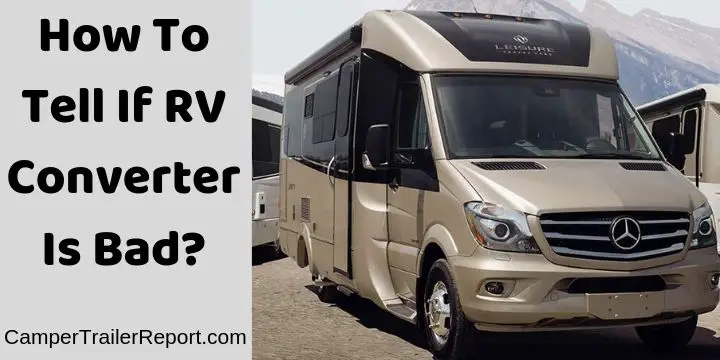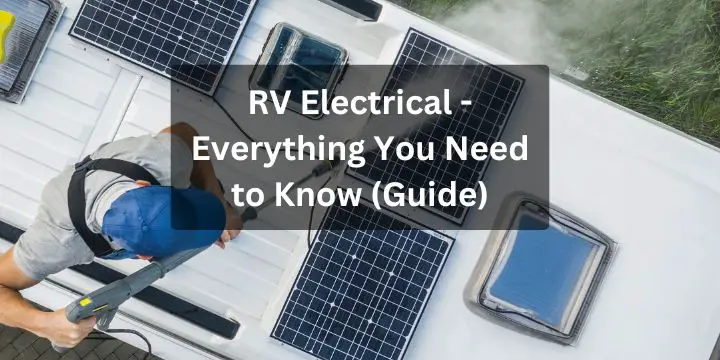How To Tell If RV Converter Is Bad?
Using your RV to tour across the country is among the most exciting adventures you could ever experience. But what if the RV converter begins to act strangely on the way?
Actually, you won’t be able to enjoy your travel if all your important devices like Cameras, laptops, and smartphones don’t get enough power to operate. It’s better to ensure that everything is fine with your RV before the journey. Read on to understand and know how to tell if RV converter is bad!
Signs of a bad RV converter
1. Bad performance
Basically, bad performance is the first sign of a faulty RV converter. This happens when your converter produces inadequate power to optimally run its 12V DC electrical system, hence the batteries can’t retain a constant supply of charge any longer.
Besides, one faulty battery can as well be drawing power from the system hence causing the bad performance of your RV. You are required to spot the problems with your batteries immediately.
To check the batteries condition, just fully charge them then cut off their connection. Sit for a while then check each battery’s charge using a multimeter. A bad battery can’t maintain a constant flow of charge.
2. Abnormal voltage range
The abnormal voltage range is another sign of a bad RV converter. This might happen in either at the entry point of 110V AC supply to the RV or in the 12V direct current breaker box.
Consider using a voltmeter to test the voltage at both points. You need to first check whether the voltage at the entry point is within the normal range, thereafter, check the DC breaker box. If both of them (or one) gives bad readings, you will know the cause of the problem.
3. Faulty fan
A cooling fan that isn’t working also signals a bad RV converter. The fan operates on 110V AC intermittently when the temperature of the RV reaches a particular point. The fan won’t work if there is an incorrect entry voltage into the converter.
You need to analyze a voltage test just from the entry point before working on the fan. Thereafter check the fan in general including thermal sensor or thermostat current flow. Ensure you know the main cause of the malfunctioning fan and if it can’t be fixed just replace the whole fan.
> You may also like:45 RV Accessory Must-Haves for Your Travel Trailer<<
Your RV problems can also come from;
Circuit board
Circuit breakers of your circuit board can also lead to the RV’s malfunction. To access as well as fixing them, open your circuit breaker panel and check everything that could be faulty.
Resistors and diodes
Some RVs use resistors and diodes to control the electrical system like 12V DC and onboard batteries. The system should read between 3 – 13 volts depending on the charge of a battery. A malfunctioning resistor is the often cause of a battery being unable to supply enough voltage.
Fuses
Fuses are used to protect any electrical system against excess current and they might be another problem source. Fuses can be tested using a voltage tester and replaced if bad.
Conclusion
Before judging your RV converter bad performance, you should check everything including your accessories and the 110V power source. It’s advisable to take your bad RV to a professional who has the experience and necessary tools to fix everything.
> You may also like:Worst 5th Wheel Brands to Avoid <<
What does a converter do in an RV?
Basically, an RV converter converts AC to DC. An RV comes with electronic devices and appliances, such as air-conditioner, TV, microwave, fridge, lights, pumps, fans, TV antenna booster and so on. These devices and appliances need the power to function.
The source of power for RV is normally a generator. Generators produce Alternating Current (AC). When you want to use 120V appliances in your RV, such as air conditioner, TV and microwave, you can connect power directly from the source, which can be a generator.
Why do RV coverts fail?
The function of an RV converter is to maintain a constant charge on the RV batteries. It supplies different amounts of voltage depending on the needs of each individual 12V DC appliance. It’s impossible to determine whether the converter has failed before the battery charge is exhausted.
RV converts can fail because of the following reasons:
Overuse: RV converters have their operating limit. Therefore, if you use them beyond those limits, they will fail. Most people use RV converters beyond their limits because of lack of knowledge or by choice.
Video Overview: RV Converter, replacing it! How to know it’s bad and how to replace it!
Under and overvoltage
RV converters come with a specified voltage rating. If the voltage from the power source exceeds the stipulated voltage rating on the converter, it may fail. Also, if the voltage is lower than the voltage rating prescribed on the converter, it may fail.
Ultrasonic vibrations
These vibrations come from the cores of inductive components and they can cause friction. The friction can generate heat in the device, damaging certain components of the inverter.
Will an RV converter work without a battery?
Most appliances inside your RV need 12V DC battery system to function. For the 12V DC battery system to function properly you must have very good batteries and a reliable way to keep them charged. However, certain RV appliances and accessories that run on AC power like TV, air conditioner, and microwave, don’t need a battery to function. You can connect them directly to the power source or generator.
Does my RV have an inverter?
Most RVs come with inverters, although it’s not necessary. But it’s a good idea to have an inverter in your RV because anything can happen. If you love to camp in locations that lack electrical hookups and you need to power your luxury items, like Microwave, TV, computer, and air conditioner, an inverter will be necessary. That’s because a battery or solar panel alone can’t power them since they generate 12V DC. These luxury items require 120V AC to function.
What is the best RV converter?
The PowerMax Pm3-55 RV Converter Charger is the best converter out there. It’s reliable, which means it guarantees a constant supply of DC power when you need it. It’s also versatile, which means it can work for any kind and size of recreational vehicles, such as travel trailers and campers. It’s easy to install and doesn’t interfere with radio, and TV signals.
Can I start my RV while plugged in?
You can start your RV while plugged in. RVs have safety devices to cushion against any danger coming from this. However, most people like to play safe, and so they ensure to start their RVs while plugged out and then plug in later when everything is running properly in the RV.
> You may also like:Gas vs Diesel For Towing a Fifth Wheel?<<


